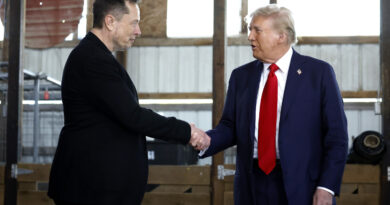Opinion | There’s a Way to Halt Trump’s Baseless Election Fraud Cases
First, it helps to understand how unusual it is that the president’s cases are getting tossed so quickly. Generally, plaintiffs get the benefit of the doubt when they’re filing lawsuits. If they have some combination of factual support for their complaint and an existing law to apply, courts are inclined to let the cases proceed. But the Trump campaign and its Republican allies are falling far short of even these low thresholds on evidentiary and legal grounds. And this is why judges have been so quick to shut them down or refuse to even hear them, as happened this week twice at the Supreme Court.
It’s not uncommon for people who proceed without counsel to bring spurious complaints about fanciful government conspiracies or file suits that misunderstand the law. Judges don’t usually penalize lay people for their mistakes. But when courts suspect that trained lawyers know of their cases’ shortcomings and deficiences and filed them anyway, they can tell litigants “enough is enough.”
And the primary way federal judges do it is with Rule 11. Rule 11 is a Congressionally-sanctioned tool that enables judges to keep attorneys honest in their courtrooms. Its goal is to deter parties from filing and pursuing frivolous lawsuits, and ensuring fairness to those on the other side who might have been unfairly hauled into court. Baseless claims waste courts’ finite time and resources, clogging the judicial system and hindering meritorious claims from proceeding.
Some might argue that allegations that are as serious-sounding as Trump’s assertion of “the greatest Election abuse in the history of the United States” deserve extra latitude, that the volume of complaints is somehow its own evidence of how widespread the problem is.
The opposite is true. The insufficiency of the claims is evidence of bad faith, and that is precisely what Rule 11 is designed to punish. Trump supporters’ litigious assault on the 2020 election results is even more troubling than most groundless claims because it creates a perverse incentive for candidates and parties to abuse the courts for political gain in future high-profile elections.
Rule 11 is a “stop-and-think” mandate, which basically requires lawyers and parties to certify when signing their names to federal court filings that they have some law and some facts on their side. When a party files a lawsuit, it accordingly certifies that “the claims, defenses, and other legal contentions are warranted by existing law or by a nonfrivolous argument for extending, modifying, or reversing existing law or establishing new law.” Courts cannot create new laws—legislatures do that.
To be sure, laws evolve to meet new factual scenarios. This is what Rule 11 means when it refers to a nonfrivolous argument for extending new law. The Supreme Court did this, for example, when it extended marriage rights to gay couples under pre-existing constitutional standards of due process and equal protection under the 14th amendment. (Before Obergefell v. Hodges in 2015, states could ban same sex marriages.) But that’s not what’s happening with Trump’s post-election cases.
Rudy Giuliani and other lawyers on the plaintiffs’ side of these cases, when pressed by judges, have admitted that they are not claiming fraud, despite what they have said publicly for weeks. Fraud entails the telling of meaningful lies that harm victims. In the election context, fraud could mean lying about being a registered voter, or lying about being an American citizen, or using the identity of a voter who is actually dead.
So the Trump campaign and like-minded plaintiffs have resorted to tortured interpretations of other laws to cram square pegs into round holes. Take the latest—but potentially most dangerous—the failed lawsuit filed by Texas Attorney General Ken Paxton, which sought to cancel the votes legitimately cast by millions of citizens of four other states: Georgia, Michigan, Pennsylvania and Wisconsin. Seventeen additional states and 126 congressional Republicans have since joined Paxton, whose petition leapfrogged over two tiers of lower courts and was filed directly in the U.S. Supreme Court.
Paxton’s suit had a number of flaws, but for purposes of the Supreme Court’s equivalent to Rule 11, it cannot be overemphasized that no law requires legislatures from one state (here, Georgia, Michigan, Pennsylvania and Wisconsin) to consider other states’ feelings (here, Texas) when they make their own election laws. Paxton’s suit basically complained about just that: that by passing their own election laws in ways that led to “[i]ntrastate differences in the treatment of voters,” the defendant states somehow harmed Texas.
The Supreme Court’s unsigned order Friday slammed the door on that bogus argument: “Texas has not demonstrated a judicially cognizable interest in the manner in which another State conducts its elections.”
So, these lawsuits are scandalously thin on the law. They are also thin on facts.
Rule 11 treats signatures on court documents as certifications that “the factual contentions have evidentiary support or, if specifically so identified, will likely have evidentiary support after a reasonable opportunity for further investigation or discovery.” Note the operative word here: reasonable. Courts apply a reasonableness standard to filings. Lawyers cannot file documents with allegations they know are false, for example. Likewise, lawyers can’t take something they pulled off of Reddit and put it in a complaint as the factual basis for a lawsuit. Rule 11 requires that the certification be made “to the best of the person’s knowledge, information, and belief, formed after an inquiry reasonable under the circumstances.”
Despite having told courts there is no evidence of fraud, Rudy Giuliani waved a binder before Michigan legislators recently, claiming it contained affidavits alleging widespread voter fraud. But even Giuliani apparently knows that whatever was in that binder is not enough to press a case in court. Lawyer Sidney Powell—with whom the Trump campaign cut ties after some particularly bizarre claims—has repeatedly alleged a conspiracy involving the late Venezuelan president Hugo Chavez and the creation of Georgia’s voting machines by Dominion Voting Systems, Inc. Lawyers cannot pull allegations out of hats without first conducting a reasonable inquiry into their accuracy. No surprise then that judges have already dismissed cases filed by Powell in Michigan, Georgia, Arizona and Wisconsin.
So far, several of the post-election lawsuits aimed at overturning Joe Biden’s win could be sanctionable. In Arizona, for example, in dismissing a GOP lawsuit that sought an audit of county ballots and delay of the state’s election certification, Arizona State Court Judge John Hanna virtually invited the secretary of state to seek payment for attorney’s fees from the Arizona Republican Party for filing a lawsuit “without substantial justification” or “solely or primarily for delay or harassment.” In Bowyer v. Ducey, a federal judge in Arizona tossed out a Powell-led lawsuit challenging ballot signatures and machinery, noting that the allegations of impropriety were “sorely wanting of relevant or reliable evidence,” and were instead “largely based on anonymous witnesses, hearsay, and irrelevant analysis of unrelated elections.” She added that it would be “extreme, and entirely unprecedented” to hear the claim.
The question remains: Will any of the attorneys involved in these specious cases be held accountable by a judge? Rule 11 sanctions (and their state-law equivalents) are rare. But rare doesn’t mean non-existent.
In White v. General Motors Corp., Inc., for example, the Court of Appeals for the Tenth Circuit—where Justice Neil Gorsuch used to sit—ordered the plaintiffs and their lawyers to pay $172,382 to the other side in attorneys’ fees. The case alleged slander, but the complaint didn’t name the employee who allegedly committed the slander, and when the defendant found the employee and secured an affidavit denying the slander, the plaintiffs refused to withdraw the case. The court noted:
“[W]e have the tragedy of inept lawyers who failed to investigate their claims, and who compounded the court’s and the defendant’s problems in dealing with the case by adopting an extremely aggressive approach. Rule 11 should not be used to discourage advocacy, including that which challenges existing law. Nevertheless, the court is entitled to expect a reasonable level of competence and care on the part of the attorneys who appear before it, and to expect that claims submitted for adjudication by those attorneys will have a rational basis.”
Rule 11 sanctions are normally triggered when the offended party files a motion. The alleged wrongdoer gets 21 days to fix the problem, else the court gets involved. Courts can also prompt sanctions on their own—or “sua sponte.”
If it’s a party that brings up sanctions, courts can order monetary fines to be paid to the court under Rule 11 (not to the other party, for fear of creating incentives to seek sanctions as a moneymaking enterprise). Courts cannot impose money penalties on parties (e.g., the Trump campaign) for failing to understand the law. But parties can be ordered to pay monetary penalties for proffering baseless facts.
Moreover, courts can sanction parties and lawyers in ways that do not involve money. At the federal level, non-monetary sanctions have included public reprimands, orders to undergo legal education, referrals to the bar for disciplinary proceedings, warnings, suspension or even disbarment, forced admission of the facts alleged by the other side, and bans on a party or attorney (e.g., Powell or Giuliani) from bringing similar suits without advance permission from the court.
Rule 11 provides a final basis for sanctioning lawyers and parties, and it’s critical. Whenever a paper is filed in a federal court, the person signing the paper certifies that “it is not being presented for any improper purpose, such as to harass” or “cause unnecessary delay.” The dozens of lawsuits that nitpick the hard work of hundreds of thousands of election officials, poll workers and volunteers as a basis for overturning Joe Biden’s win are not about achieving justice. They are about hardline politics, pure and simple.
Courts exist to do justice, not carry water for losing politicians. In this moment, lawyers and judges should use the tools provided under existing procedural rules to stop this kind of gamesmanship, and send a message to the bar that democracy is not to be toyed with in the hallowed halls of the judiciary.
*** This article has been archived for your research. The original version from POLITICO can be found here ***


